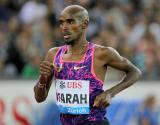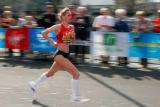Folders |
Takeaways From Boston and London MarathonsPublished by
Five Takeaways from the Boston and London Marathons By Chris Lotsbom, @ChrisLotsbom for Dyestat The Boston Marathon and Virgin Money London Marathon are now behind us, bringing a close to the traditional major spring marathon season. Hot off London’s finish Sunday, we took a look back at five lessons learned from the pair of Abbott World Marathon Majors. 1) Next Generation of Stars. Running fans learned two new Kenyan names to get familiar with — Geoffrey Kirui and Daniel Wanjiru. Few would have picked both to come out on top in Boston and London, respectively, but they each did so with decisiveness. Kirui left two-time Olympic medalist Galen Rupp in his wake after a blistering 4:28 23rd mile en route to winning Boston, a firm stamp that he’s now a game-changer in the marathon. Kirui only had two completed marathons — none of which were World Marathon Majors — to his name before Boston. Now he’s got the most prestigious title of all. “In my mind, I was sure that one day I would win this race,” Kirui said after his victory. “To come here to Boston, I knew I was going to face my colleagues who have run many times here. I was not aware at the time I was going to win, but I knew that I would challenge some of the champions who have been competing here.” And in London, Wanjiru made a claim to become the newest star with the surname Wanjiru (of note, The Guardian mistakenly proclaimed in a headline that the late Samuel Wanjiru —2008 Olympic gold medalist who passed away in 2011 — had won Sunday’s race. Daniel and Samuel are not related). But it was 24-year-old Daniel Wanjiru who left Kenenisa Bekele struggling to hold on and catch up. Wanjiru lowered his personal best from 2:08:18 to 2:05:21 to win his first major. “I’m really happy as it’s my biggest win at my first attempt at a World Marathon Majors race,” Wanjiru said. “I’ve been preparing to win this race since Christmas, so I’m very grateful that I achieved my goal.” 2) Marathon Debut Madness Many running fans thought Jordan Hasay would have a strong debut in Boston. Few thought she would place third among women, defeating the likes of past Boston champions Caroline Rotich, Atsede Baysa and Buzunesh Deba (the course record holder), as well as American Olympian Des Linden. Hasay wasn’t the only one to knock their marathon debut out of the park. Her Nike Oregon Project teammate Suguru Osako of Japan finished third in the men’s race in 2:10.28, only behind champion Kirui and fellow Oregon Project star Rupp. Hasay ran brilliantly composed as if she’d completed 26.2 miles ad nauseam in training, and Osako hung tough through the course’s many hills. Whether it is coach Alberto Salazar’s familiarity with the Boston course, Hasay and Osako’s natural progression up to the distance, or a combination of both, it bodes well for their respective futures. An interesting stat: Hasay’s 2:23:00 debut – the fastest ever debut marathon by an American woman — was 50 seconds faster than Olympic 5,000-meter gold medalist Vivian Cheruiyot’s debut six days later in London (2:23:50). Pretty impressive, considering how much faster London’s course is regarded than Boston’s. Osako — who entered Boston late — renewed a lasting Japanese legacy in Boston, where men of his native country have won eight titles. Not since Toshihiko Seiko’s 1987 win had a Japanese man finished on the podium. That changed with Osako’s hard-fought run. “My body was trained for this being the first experience I’ve had with the marathon. I definitely got nervous and my muscles tensed up,” Osako said after Boston, speaking through a translator. “Going forward, I will train differently and will do more marathons.” Look for both Hasay and Osako to improve in their next marathons. “I plan on running a fall marathon, but I can still potentially run the 10,000 on the track and come back for a fall marathon. I will see how my body recovers,” Hasay said. 3) Nothing is Impossible. When Mary Keitany began to push at an incredibly demanding pace early in the London Marathon, many scoffed that she’d be able to maintain her tempo all the way to the finish at The Mall. Hitting 5 kilometers in 15:31, 10 kilometers in 31:17, and the halfway point in 1:06:54, jaws began to drop and reaction only grew on social media. I admit, I didn’t think Keitany could keep it up and take down Paula Radcliffe’s 2:17:42 women’s-only world record. (In my mind, I couldn’t help but remember when she’d gone out at world-record pace in New York City in 2011, only to falter and fade to third). Then the clock stopped at 2:17:01. “My body felt fit enough and I have trained well and I tried to push all the time. I’m very happy with the finish time,” Keitany said. For so long, Radcliffe’s world record had seemed simply untouchable. It took a fearless effort by Keitany to challenge the mark, something that was daunting for countless others over the past 12 years. In a bigger spectrum, though, what does Keitany’s mark say about other records on the books? Could Radcliffe’s 2:15:25 all-comers record come down soon? And what does it say about the men’s two-hour marathon effort? Seeing her race only reiterated the point that no record is too far out of reach, especially when a talented and experienced runner, like Keitany, has their eyes on it. 4) Could Edna Kiplagat be the best women’s marathoner of all time? For the better part of two decades, Paula Radcliffe has been hands down regarded as the top women’s marathoner in history. Yes, Radcliffe ran world records and racked up countless titles in London, New York and Chicago. But, could Kiplagat now be giving her a run for her money? By winning Boston — going away, nonetheless — Kiplagat can say she's won titles in Boston, New York, London, Los Angeles and a pair of IAAF World Championships Marathon titles. Not to mention, an Abbott World Marathon Majors crown. In this day and age, Kiplagat has sometimes been overlooked by others who have clocked faster times, like Keitany. But no one has been as consistent as Kiplagat since the days of Radcliffe. Plus, one could say that it’s tougher to win major marathons now than when Radcliffe did, simply because of the depth of fast women. What’s the key to Kiplagat’s sustained success? Two words that come to mind are savvy and calculated — a pair of adjectives that aren’t often connected to the caring mother of five children. According to Kiplagat’s manager Brendan Reilly, Kiplagat purposely dropped a few steps back mid-race to survey her competitors. Confident in her ability, Kiplagat simply wanted to observe her competitors, judge how they were feeling and strike at the first sign of fatigue. That’s just what she did, and now she’s got a shiny new Boston Marathon Champion’s Medal in her trophy case. “When I was running, my body was feeling good,” Kiplagat said. “When we were at the hills, I tried to increase the pace and see if I can survive. I tried to push hard and I assume my fellow athletes weren’t picking up the pace, so I pulled away.” 5) British Boom For the last year, a resurgence in British distance running has blossomed on the international level. In addition to Mo Farah, runners like Laura Muir, Callum Hawkins and Andy Butchart have rose to the occasion and become household names when talking about contenders. Can we now add Josh Griffiths to the list? Griffiths was the top British male finisher in London, clocking a 2:14:49 debut marathon to earn a spot on the World Championships team this summer (also in London). Report is that Griffiths didn’t even start with the elites. That’s a pretty impressive stat for a debut. “It was really nice passing people and not being passed,” he said. “I had the Welsh Commonwealth Games qualifying standard in my head so I planned to go off at that pace and see if I could hold it. I felt good and I was catching people all the way through.” While the traditional major marathon season is now over, there’s still one highly anticipated race remaining: the sub-two hour effort that’ll happen in Italy next month. As we learned in both Boston and London, anything can happen over 26.2 miles. We’ll just have to wait and see what’s in store. More news |









